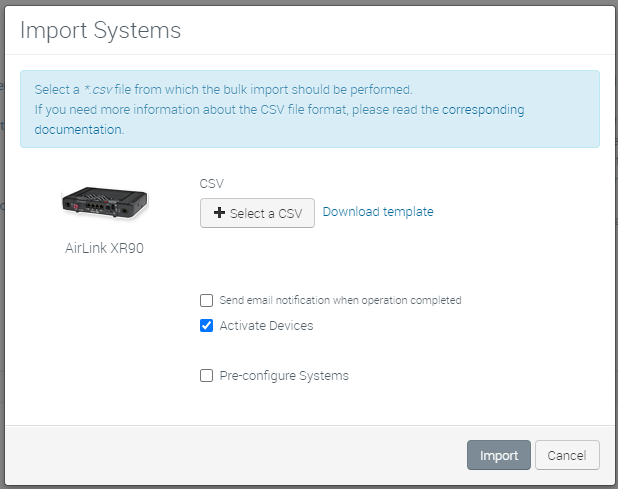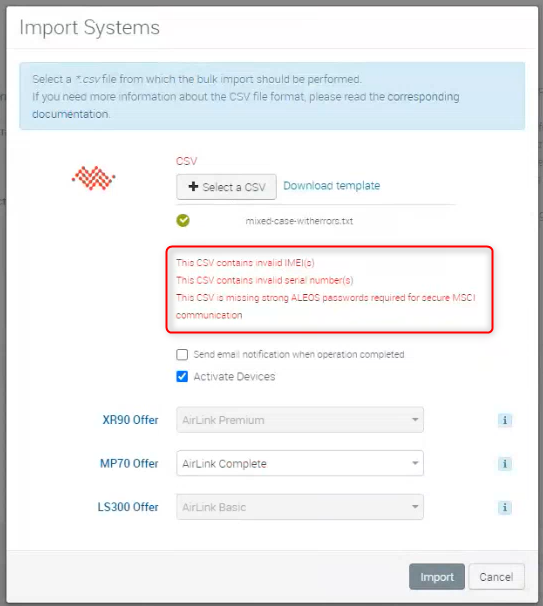How to register a list of systems?
ALMS supports registering multiple devices at the same time as a bulk upload operation, using a CSV file. You can register different router models running different operating systems in the same bulk upload operation.
For example, your CSV bulk registration file can contain data for a mixture of different AirLink routers such as:
- XR90 running AirLink OS
- RX55 running AirLink OS
- MP70 running ALEOS
- LX60 running ALEOS
To register multiple systems from a file:
From the Register page, click Import a list. The Import Systems window appears.

From the Import Systems window, select Download template.
Populate the downloaded CSV file with the information for all the devices that you want to register.
- For more information on how to fill out the CSV file, please review the table below. You may need to leave certain fields in the template empty, depending on which router models you are registering. For example, routers running AirLink OS like the AirLink XR90 do not require data in the GATEWAY[IMEI] field, while an router running ALEOS such as an AirLink RV55 does not require the GATEWAY[REGISTRATION CODE] field to be completed.
Click Select a CSV and select the file you just populated for bulk system import.
There may be a slight delay while ALMS validates the file. Notifications will appear if the file contains any errors, such as invalid serial numbers or missing registration codes.

Click Send email notification when operation completed if you want to be notified by email when the import is completed.
Select Activate Devices (default) to activate all devices on registration.
Select whether to preconfigure the device after clicking Register. To simplify your deployment, you can pre-designate the configuration you want ALMS to apply when it connects the first time. For more information, see How to register systems with an initial configuration? This option is not available when registering different router models using a bulk registration CSV file.
Select the Offers you want to activate the devices on.
The offers that appear depend on which router models are included in the bulk registration file. Some routers may only support a single offer, and you cannot select an offer for those routers.
Click Import.
ALMS launches separate register operations for each router you want to register. You can monitor the operations to confirm when registration is complete. See How to use Operations for more information.
Bulk Registration CSV file format
The file format is a .csv file (comma separated text file). Both comma ‘,’ and semi-colon ‘;’ are supported as separators.
| FIELD | USE | DESCRIPTION |
|---|---|---|
| GATEWAY[IMEI] | Mandatory for routers running ALEOS | IMEI or ESN of the gateway to be created. |
| GATEWAY[SERIAL NUMBER] | Mandatory for all routers running ALEOS or AirLink OS | Serial Number of the gateway to be created. The serial number begins with 2 letters and can be from 13 to 16 characters (skip the dash ‘-’ if there is one). The serial number can be retrieved or scanned from the gateway. |
| GATEWAY[REGISTRATION CODE] | Mandatory for routers running AirLink OS | Registration code of the system to be created. The Registration Code can be retrieved or scanned from the device label. |
| NAME | Optional | Name to be set for the system. |
| LABELS | Optional | One or more label(s) to be applied to the created system. For providing several labels, use the pipe ‘|’ separator. |
| MSCI[HOST] | Optional. Not required for devices communicating via LWM2M. | To be filled in for the server-initiated option. If you are currently able to initiate communications out to the gateway either by public static IP or domain name, enter public IP address or complete domain name. |
| COMMUNICATION[PASSWORD] | Mandatory for devices communicating via MSCI. Not required for devices communicating via LWM2M. | The password is required to allow ALMS to remotely change the ACEmanager password. Enter the ACEmanager password used to log in to this device directly. It is also used to enable the ALEOS server-initiated communication option. |
| M3DA[PASSWORD] | Mandatory for establishing M3DA connection | The password is required for ALEOS Application Framework (AAF) applications. |
| MQTT[PASSWORD] | Mandatory for establishing MQTT connection with a message broker | The password is required for running applications that report MQTT to AirVantage (AVTA, for example). |
| SUBSCRIPTION[IDENTIFIER] | The ICCID of an ECC SIM. | Mandatory for registering an ECC in Inventory to a gateway or router. The ICCID must match the SIM installed in the router. For more information, see See How to merge ECC SIM cards with an AirLink router at Registration |
 Searching...
Searching...

